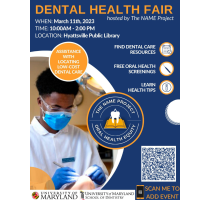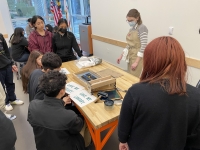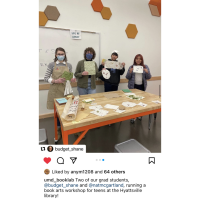Public Humanities: Connecting Campus and Community
Prince George's County Memorial Library System
Innovation Synopsis
PGCMLS partnered with the University of Maryland (UMD) College Park’s Department of English to pilot grant-funded public humanities projects at the Hyattsville Branch Library. A cohort of graduate students and faculty cultivated four projects designed to connect their research and teaching to current problems and the local community beyond the campus.
Challenge/Opportunity
The Hyattsville Branch Library serves the most linguistically, socio-economically and educationally diverse community in Prince George’s County. UMD is located under two miles from the branch, but in many ways exists in a bubble separated from the surrounding community. The public humanities partnership breaks down these barriers, connecting research in the humanities to real-world problems and disparities. Collaboration between library staff, faculty and students allows for tailored projects with maximal public impact.
Key Elements of Innovation
Direct collaboration between faculty and library staff created programs targeting library users least likely to have previous meaningful interaction with the University. The four projects, based on faculty/student expertise and community need, are:
- Dental Health Fair - responds to healthcare access inequities
- BookLab Teens Create - develops teen leadership skills through creative expression
- Community Justice: Writing and Organizing for the Public
- Central American Literature: Environment, Archive, and Access
Achieved Outcomes
Dental Health Fair provided free screenings and referrals for 222 customers (all ages), 90%+ Spanish speakers and immigrants with no insurance.
BookLab Teens Create engages 40+ teens on artistic projects, focused on public-facing advocacy topics identified by the teens to advance the community.
Community Justice project participants developed frameworks for written advocacy and community organizing.
The Central American Literature Project integrated Spanish children’s stories, unpublished in the US, into storytimes.



